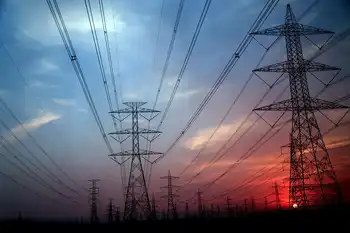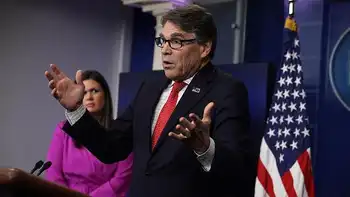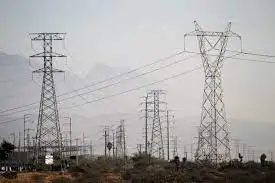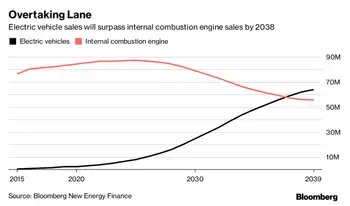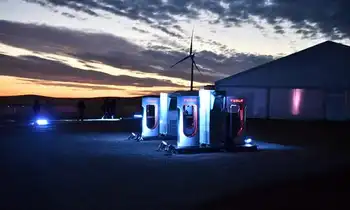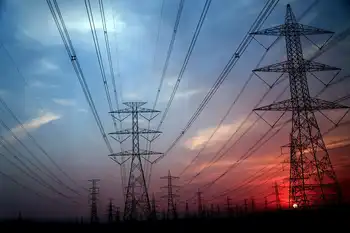"Energy war": Ukraine tries to protect electricity supply before winter
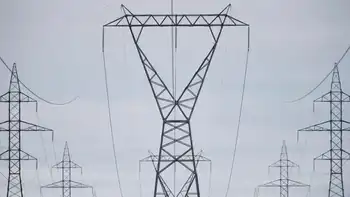
Arc Flash Training CSA Z462 - Electrical Safety Essentials
Our customized live online or in‑person group training can be delivered to your staff at your location.

- Live Online
- 6 hours Instructor-led
- Group Training Available
Ukraine Power Grid Resilience details preparations for winter blackouts, airstrike defense, decentralized generation, backup generators, battery storage, DTEK restorations, EU grid synchronization, and upgraded air defenses to safeguard electricity, heating, water, and essential services.
Key Points
Ukraine Power Grid Resilience is a strategy to harden energy systems against winter attacks and outages.
✅ DTEK repairs, backup equipment, and fortified plants across Ukraine
✅ Expanded air defenses targeting missiles and attack drones
✅ EU grid sync enables emergency imports and power trading
Oleksandr Gindyuk is determined not to be caught off guard if electricity supplies fail again this winter. When Russia pounded Ukraine’s power grid with widespread and repeated waves of airstrikes last year, causing massive rolling blackouts, his wife had just given birth to their second daughter.
“It was quite difficult,” Gindyuk, who lives with his family in the suburbs of the capital, Kyiv, told CNN. “There is no life in our house if there is no electricity. Without electricity, we have no water, light or heating.”
He has spent the summer preparing for Russia to repeat its strategy, which was designed to sow terror and make life unsustainable, robbing Ukrainians of heat, water and health services. “We are totally ready — we have a diesel generator and a powerful 9 kWh battery. We are not scared, we are ready,” Gindyuk told CNN.
As families like Gindyuk’s gird themselves for the possibility of another dark winter, Ukraine has been rushing to rebuild and, drawing on protecting the grid lessons, protect its fragile energy infrastructure.
The summer provided a respite for Ukraine’s power grid. Russia focused its attacks on military targets and on ports on the Black Sea and the Danube River, to hinder Ukraine’s efforts to move grain and choke off an important income stream.
As the days grow shorter and the temperatures drop, Russia has another opportunity to try to break Ukrainian resilience with punishing blackouts. But this winter, defense and energy officials say Ukraine is better prepared.
With limited Ukrainian air defenses in operation last year, Russia was able to target and hit the energy grid easily, including during missile and drone assaults on Kyiv’s grid that strained responders.
“The Russians may use a combination of missile weapons and attack UAVs (unmanned aerial vehicles, or drones). These will definitely not be such primitive attacks as last year. It will be difficult for the Russians to achieve a result - we are also preparing and understanding how they act.”
DTEK, the country’s largest private energy company, has spent the past seven months restoring infrastructure, trying to boost output and bolstering defenses at its facilities across Ukraine, mindful of Russian utility hacks reported elsewhere.
“We restored what could be restored, bought back-up equipment and installed defenses around power plants, as Russian-linked breaches at US plants have underscored risks,” DTEK chief executive Maxim Timchenko told CNN.
The company generates around a quarter of Ukraine’s electricity and runs 40% of its grid network, making it a prime target for Russian attacks. Four DTEK employees have been killed while on duty and its power stations have been attacked nearly 300 times since the start of the full-scale invasion, according to the company. “Last winter, determination carried us through. This winter we are stronger, and our people are more experienced,” Timchenko said.
Russia launched 1,200 attacks on Ukraine’s energy system between October 2022 and April 2023, with every thermal power and hydro-electric plant in the country sustaining some damage, according to DTEK.
In a damage assessment report released in June, the United Nations Development Programme said that Ukraine’s power generation capacity had been reduced to about half of what it was before Russia’s full-scale invasion. “Ukraine’s power system continues to operate in an emergency mode, which affects both power grids and generation, amid rising concerns about state-backed grid hacking worldwide,” a news release accompanying the report said.
The report also laid out a roadmap to rebuilding the energy sector, prioritizing decentralization, renewable energy sources and greater integration with the European Union. Ukraine has been hooked into the EU’s power grid since the full-scale invasion, allowing it to synchronize and trade power with the bloc. But the massive wave of attacks on energy infrastructure last winter threw that balance off kilter.





